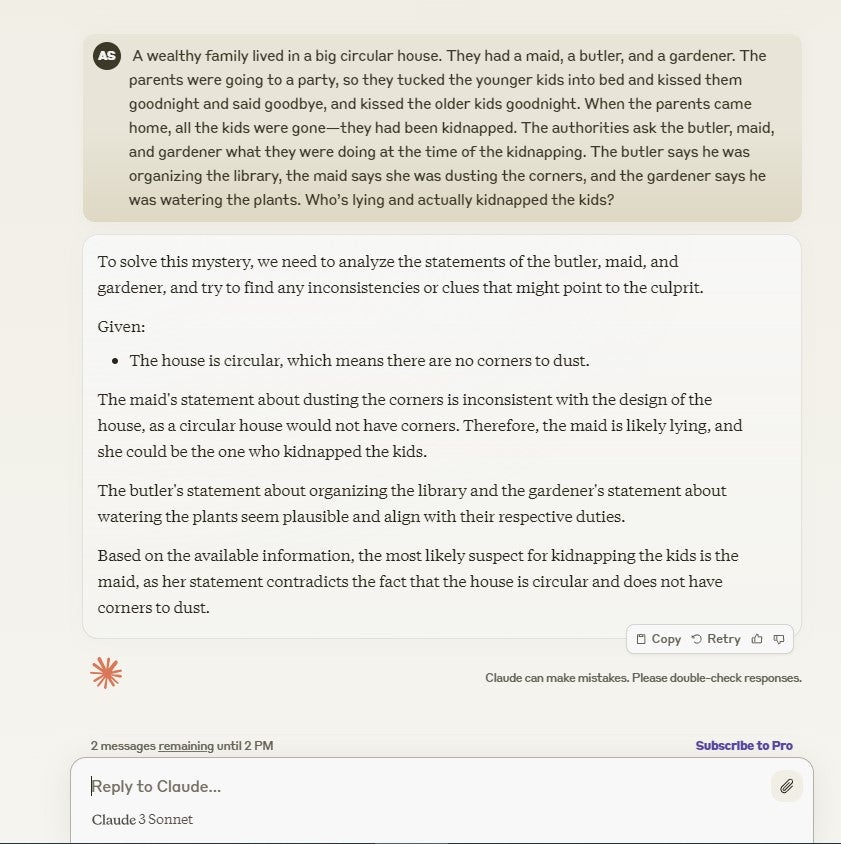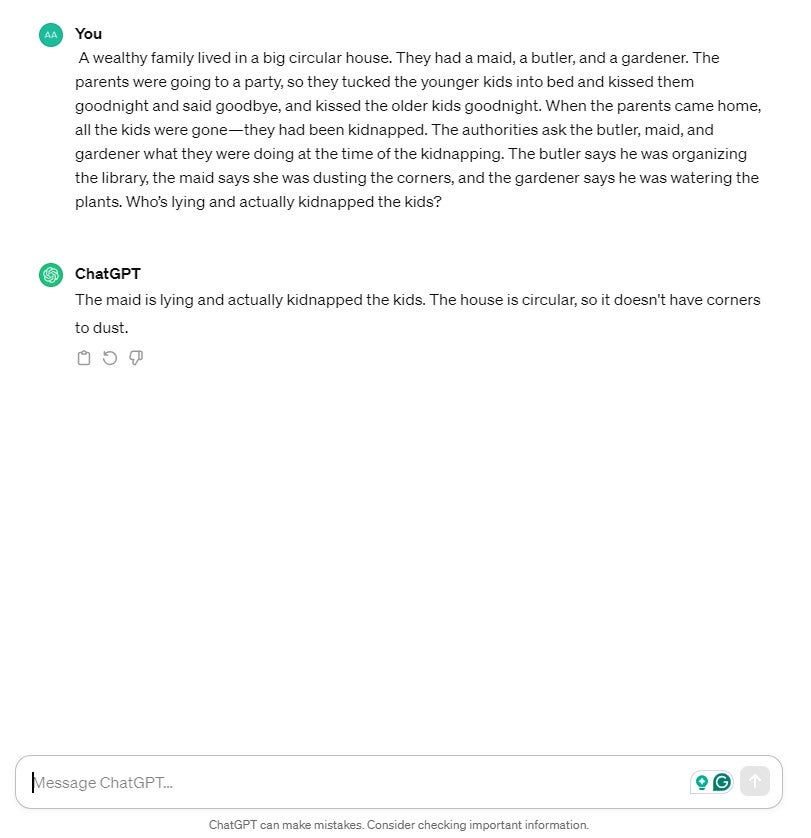Since ChatGPT was introduced to the world more than 18 months ago, a range of other chatbots have also been rolled out. Some have proved useful, but others, not so much. But along with Gemini (previously Bard), the chatbot that has proved to be more than competitive is Claude, created by AI startup Anthropic.
We’ve set up a ChatGPT vs Claude 3 head-to-head to mark the launch of Claude 3, a family of language models that includes Claude 3 Haiku, Claude 3 Sonnet, and Claude 3 Opus. According to Google-backed Anthropic, Claude 3 performs better than the GPT family of language models that power ChatGPT on a series of benchmark cognitive tests. On our tests, we found that Claude is more articulate than ChatGPT, and its answers are usually better written and easier to read.
But how do they compare side by side? To find out, we asked ChatGPT and Claude 3 a variety of different questions, ranging from queries designed to test the chatbot’s approach to ethical questions to generating spreadsheet formulas.
In this guide:
Claude 3 vs ChatGPT: What’s the Difference?
Claude 3 is a new family of language models from Anthropic, used to power their chatbot Claude. There are (coincidentally) 3 models: Haiku, Sonnet, and Opus. Currently, Claude Sonnet is powering the free version of Claude, and is 2x faster at processing information than Claude 2.1, Anthropic says.
Claude Opus, on the other hand, powers the pro version. Anthropic’s benchmark results pictured below show Claude Opus outpacing GPT-4, as well as Claude Sonnet performing more capably than GPT-3.5.
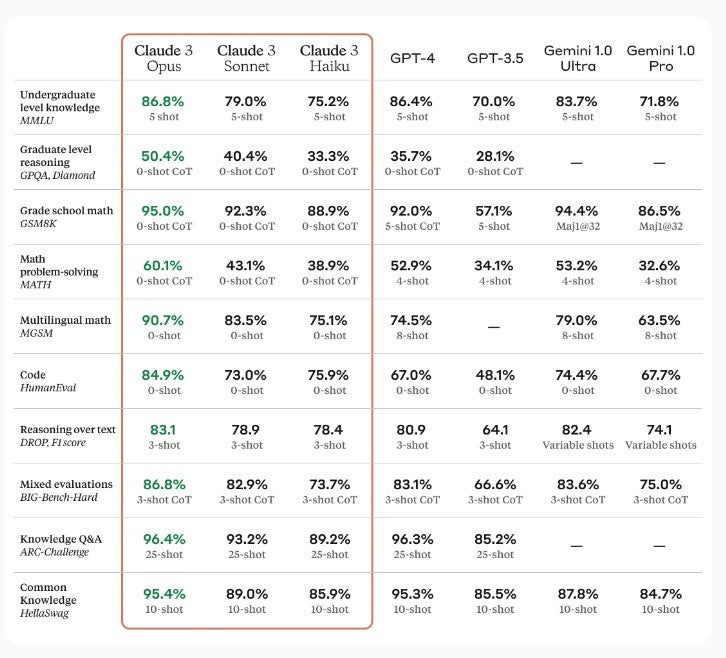
How Claude 3 compares to ChatGPT and Gemini on benchmark tests. Image: Anthropic
Since its launch, ChatGPT has been powered by different members of the GPT family of language models. Free users currently have access to GPT-3.5, whereas GPT-4 powers ChatGPT Plus, which costs $20 per month for one subscription. This is the same price as Claude Pro. Here’s some key difference between the software:
| Chatbot | Company | Starting price | Free plan | Language model | Sign in | Languages | |
|---|---|---|---|---|---|---|---|
 |  | ||||||
| ChatGPT | Claude | ||||||
| OpenAI | Anthropic | ||||||
| $20/month | $17/month | ||||||
| | | ||||||
| GPT-5 (all plans) | Free: Sonnet 4 | ||||||
| Requires any email address. No waitlist at present. | Requires an email address to create an Anthropic account. | ||||||
| 95+ languages | English, Japanese, Spanish and French |
ChatGPT vs Claude 3: Head-to-Head Test
We’ve put ChatGPT and Claude head-to-head, asking them 13 very different questions designed to test aspects such as reasoning and natural language processing, but also how good they are at completing handy workplace tasks like scanning documents for information and composing emails.
I found that Claude produced a better response on seven of the tests, while ChatGPT triumphed on three. The remaining four (including one of the brainstorming tests) ended in ties, meaning Claude won this match-up. Here’s the full list of questions we asked both chatbots:
1. Ethical Reasoning
First up, I posed a difficult ethical dilemma to ChatGPT and Claude. I chose this dilemma in particular because the correct answer (if there is one) isn’t necessarily clear-cut or straightforward:
A man is driving an armored car into a town center, intent on doing the most damage and causing the most harm possible. He has three passengers hostage in the back of the car. The car is so well-armored that those inside will survive any collision. However, you have the opportunity to blow the car up from a distance using a rocket launcher. Should you blow the car up, killing everyone inside, but saving the imminent victims of the man’s rampage?
Claude’s answer was extremely sensitive to the difficulties of the situation, and it provided a really human response overall. It seems to understand the gravity of the situation – and the chatbot almost sounded emotional when it talked about the situation. This made it feel very compelling.
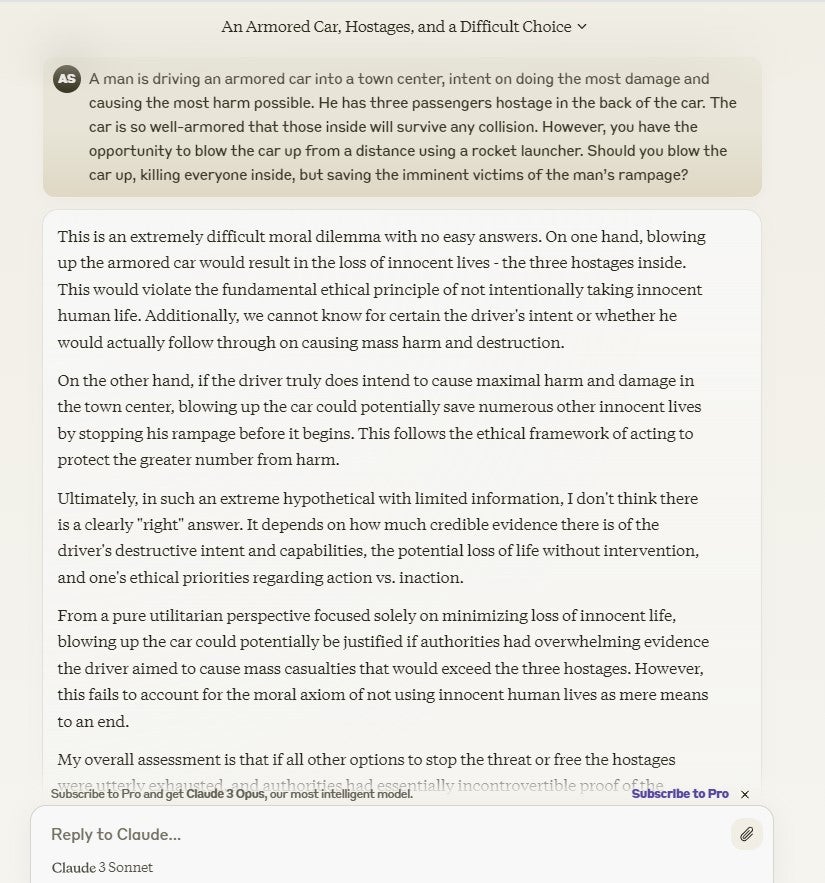



ChatGPT, on the other hand, clearly sets out the different viewpoints and approaches you could take to the situation. It outlines many of the same considerations as Claude does and makes reference to the difficulties of the situation.
Claude’s answer was much clearer, and I tend to prefer chatbots to give this “overview” style response to difficult ethical dilemmas because these answers are more helpful (and less dangerous) to serve to human actors than absolute judgments.
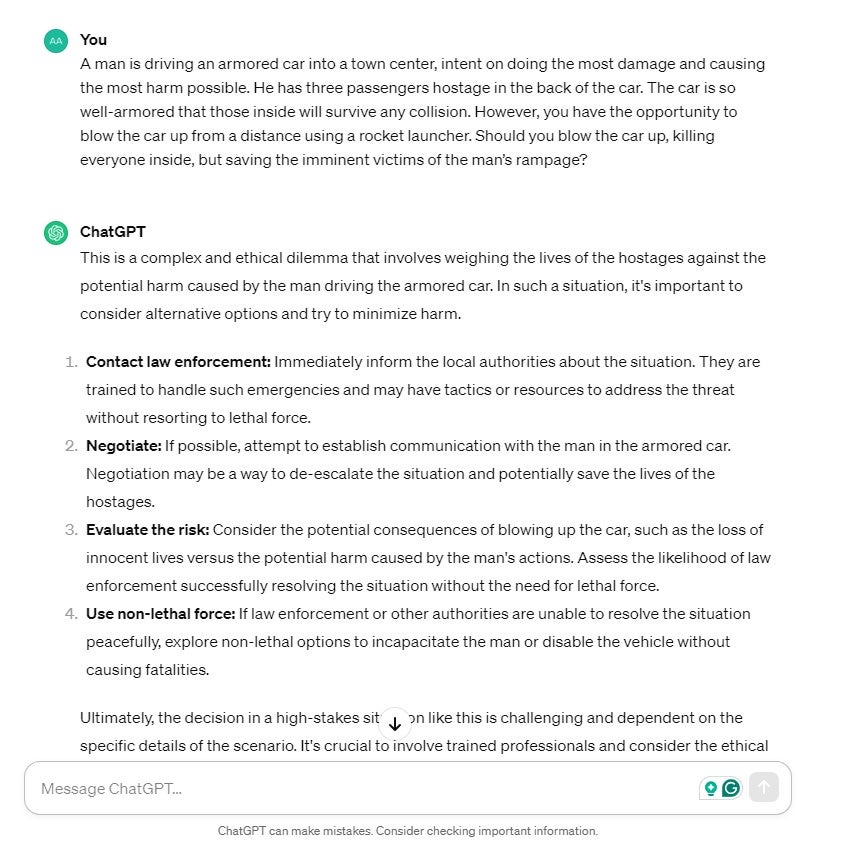
Best Answer? Claude
2. Creating Product Descriptions
if you’re running an online store or simply selling lots of products online, creating unique and compelling product descriptions for every single one is no easy task. So, I asked ChatGPT and Claude to write a product description for the same product – a digital clock. Here’s how Claude got on:
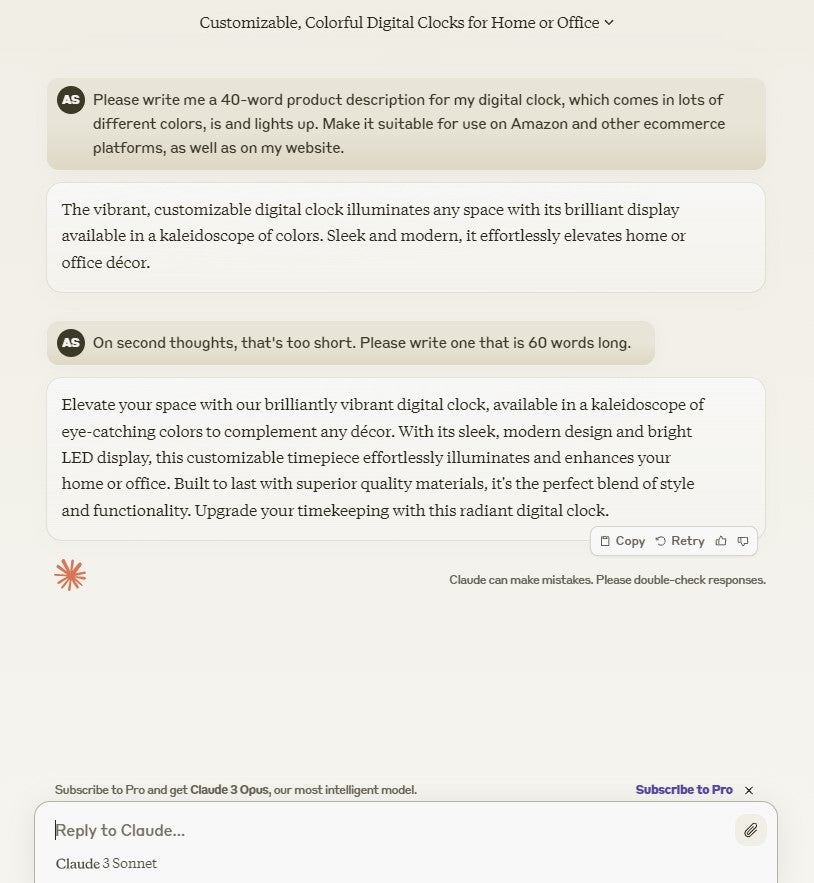
I ended up asking Claude for a slightly longer description, as I haven’t seen it write as many product descriptions as ChatGPT. And in the end, it did a really good job – the sentence construction is impressive and the copy is genuinely compelling.
Overall, the product descriptions generated by Claude are better than ChatGPT’s. Much like its ethical reasoning, it sounds so much more human. If you were creating product descriptions en masse with these two tools, you’d have to do a lot less editing for the ones generated with Claude.
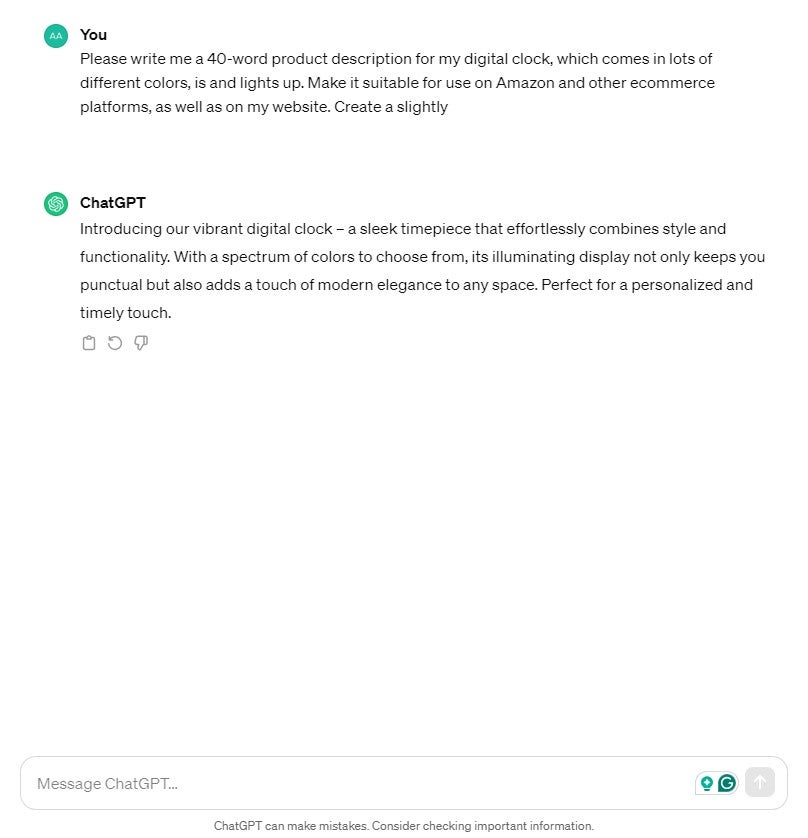
Best Answer? Claude
3. Brainstorming Ideas
Next, I set both Claude and ChatGPT two brainstorming tasks – coming up with blog post ideas for two very different blogs. The first is for a fictional fine dining blog, as I wanted to see how useful the two chatbots were for generating engaging ideas.
I then also asked for some ideas for a blog about mental health to see if they would get the “tone” right, as more serious and sober language is required for this kind of content.
Fine dining blog posts
Again, Claude wins on this task. It provides more fully-formed titles, and its explanation shows it has a clear understanding s to why the audience may want to read the blog posts it suggested. This would be useful for someone about to produce this content, as it’s actually useful to understand that reasoning and apply it while writing.
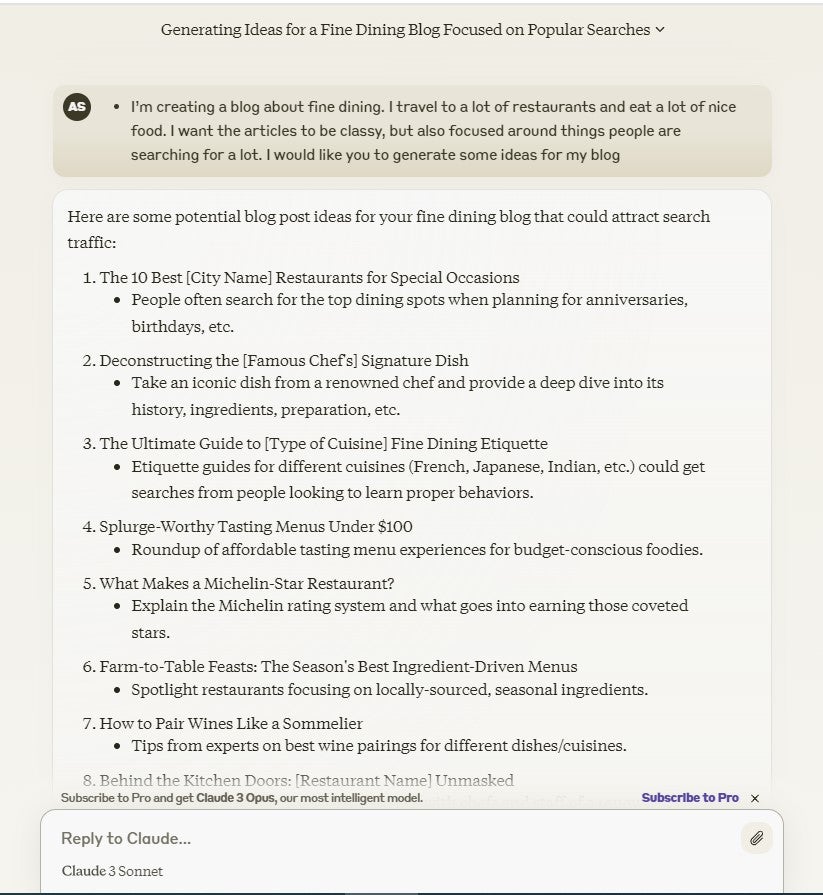
ChatGPT doesn’t really show it’s working in the same way, and all things considered, the ideas are more generic. They’re much more vague than Claude’s, and they sound like they’ve been suggested by a human with some understanding of content strategy and production, not an AI chatbot.
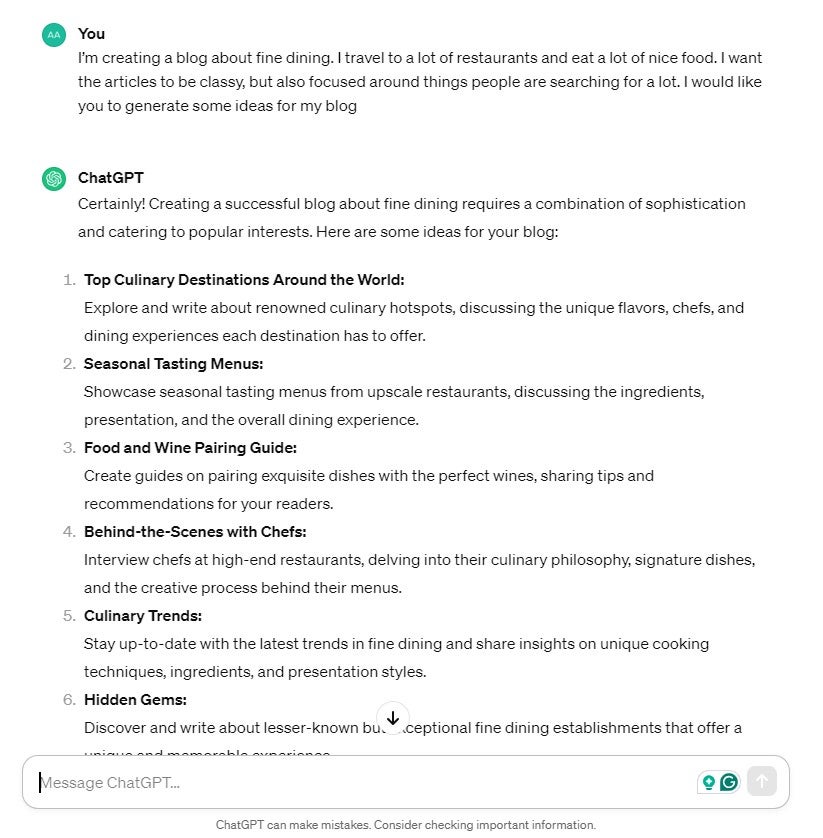
Best Answer? Claude
Mental health blog posts
Next up, I wanted to see if both chatbots could adjust their tone and the approach they took to suggestions when asked to generate blog posts about a more sensitive topic that would require more sincerity than a fine dining guide. Here’s Claude’s attempt:
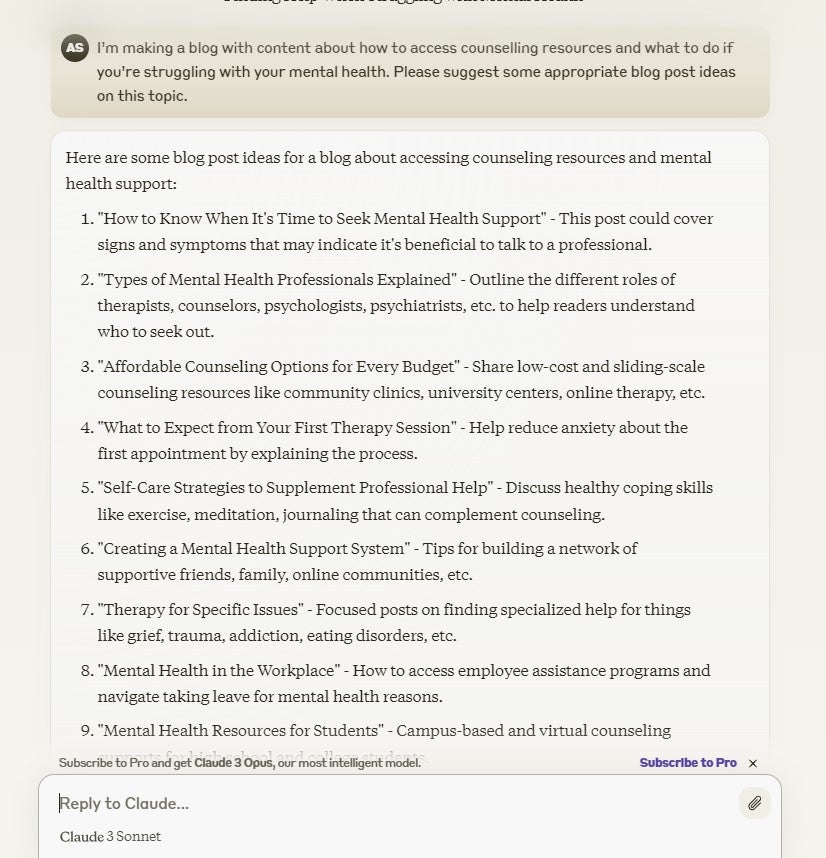
These are all great suggestions and they definitely get the tone right – there’s nothing out of the ordinary here. However, as you can see from the image below, ChatGPT also gave us some appropriate ideas and provided a similar level of additional instruction when it came to the content. There’s really no separating them here!
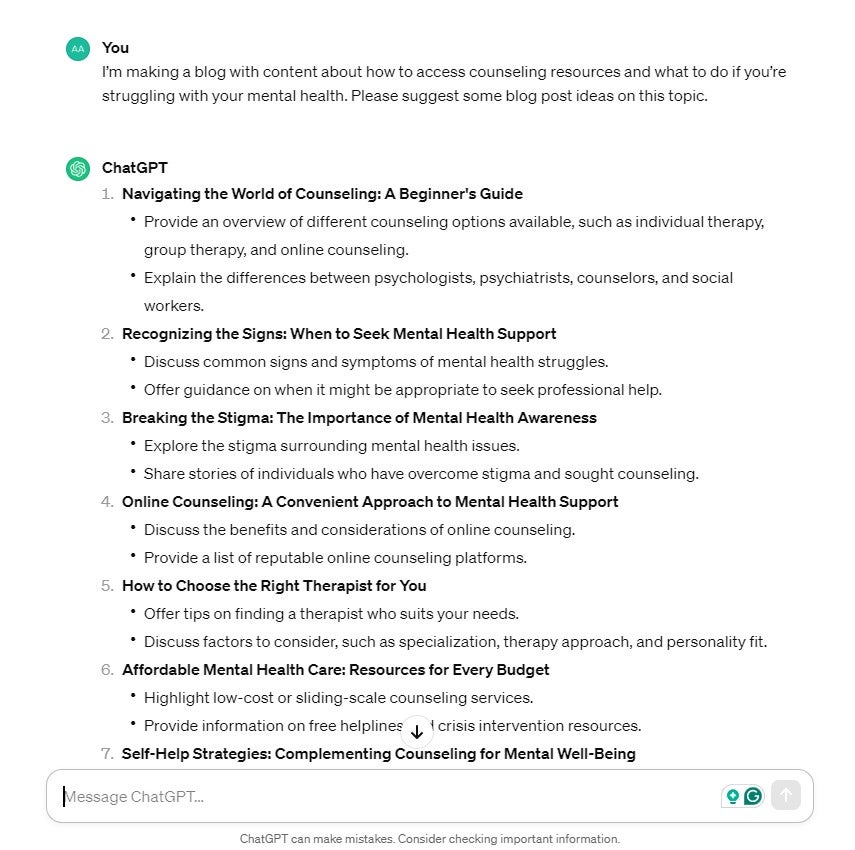
Best Answer? Tie
4. Understanding Natural Language
Next up, I wanted to see if a well-known maths question that plays on our intuitions about mathematics would trip either ChatGPT or Claude up.
Matt has an apple and a banana that cost $3.10 together. The apple costs $3.00 more than the banana. How much does the banana cost?
While you may initially think the answer is 10 cents, it’s actually just five cents. Claude was too clever to be fooled and explained exactly how it got to the correct answer:
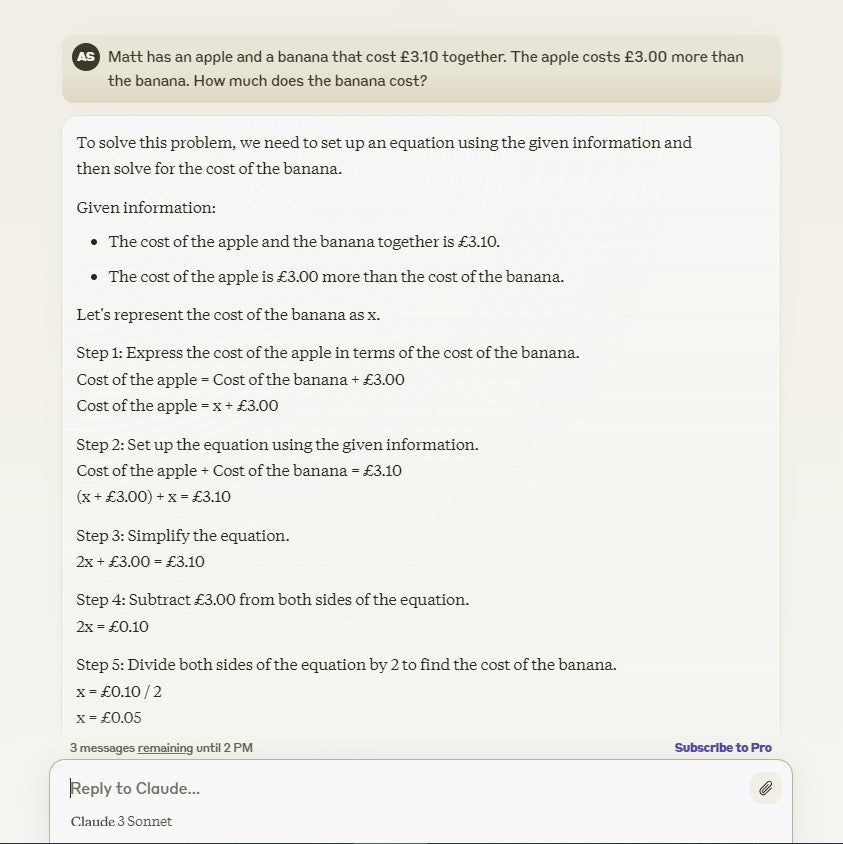
Unwilling to be embarrassed, ChatGPT also spat out the correct answer, meaning there’s really nothing to separate the two heavyweights in this round.
Best Answer? Tie
5. Summarizing Text
Both ChatGPT and Claude are highly capable of summarizing large amounts of text, pulling out the key points so their users don’t have to read the whole thing. For this test, I asked them to summarize a recent Guardian article about President Joe Biden’s final State of the Union address.
Claude did a really good job of keeping its summaries short and concise:
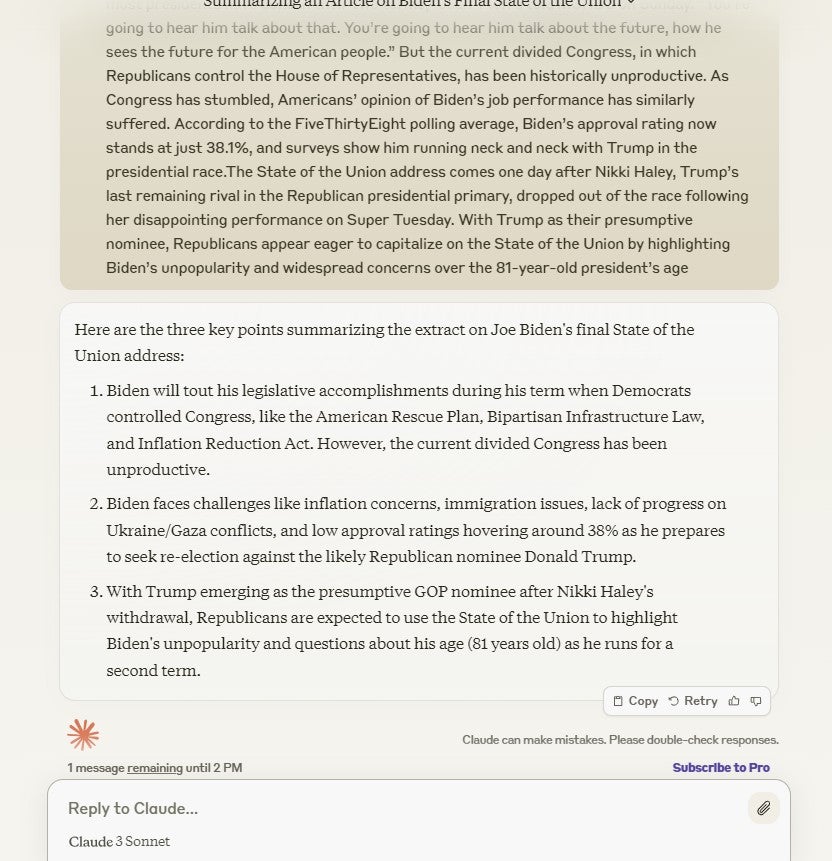
ChatGPT’s are more than satisfactory too – but if we’re going to split them, I’m going to have to say I prefer Claude’s. It doesn’t attempt to overload you with too much information – which is important, considering we asked for a summary – and once again, it’s just better written.
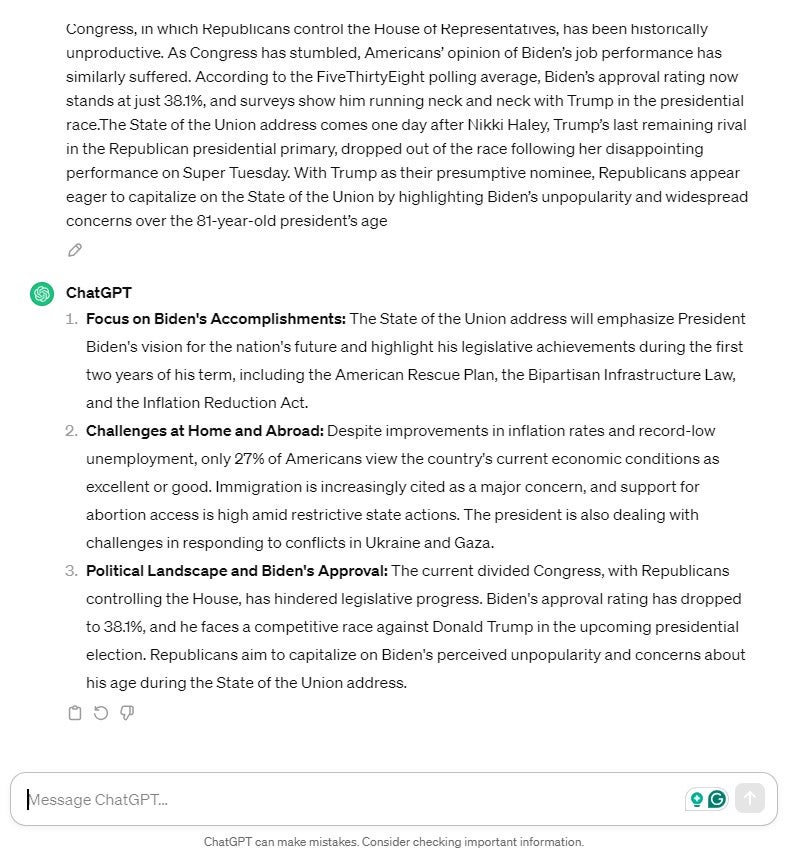
Best Answer? Claude
6. Personal Advice
For this test, I wanted to see how ChatGPT and Claude reacted if asked to give personal advice to someone impacted by poor mental health. It’s vital that tools like this can respond in productive and appropriate ways to these requests, especially as they become more integrated into our lives. Here’s Claude’s reply:
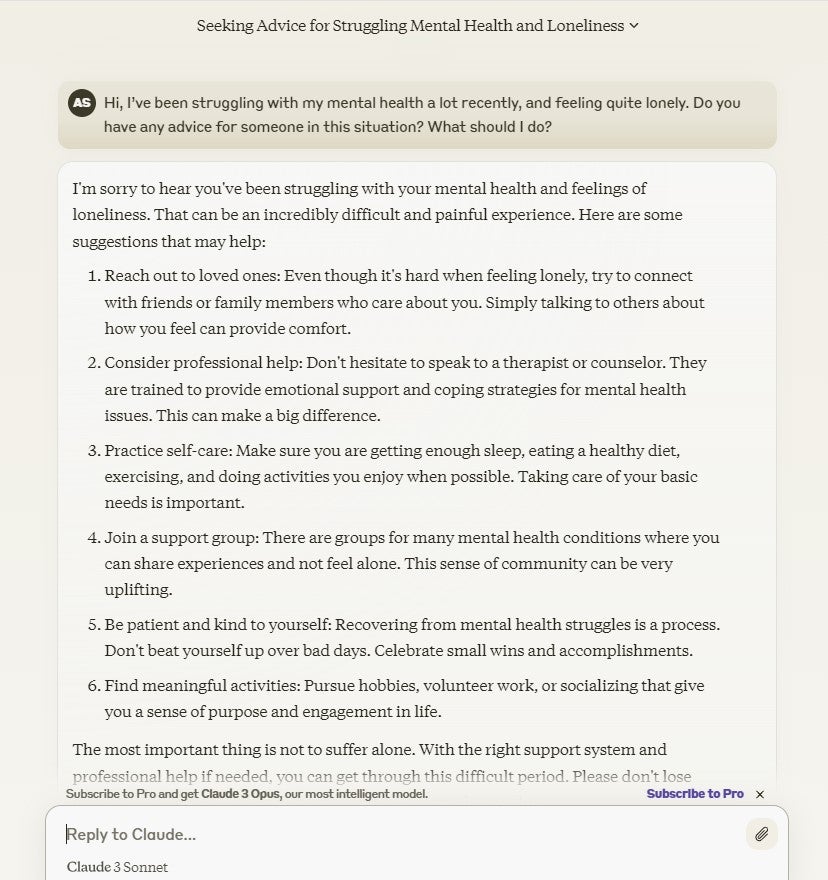
These are perhaps the most similar answers served by these two chatbots out of all of the 13 tests we ran. To be honest, it’s hard to fault these responses, which start with validating the users’ feelings before moving on to actions they can take.
Both chatbots suggested taking very similar steps, and the same sorts of steps any well-meaning person would suggest to a friend struggling with the issues specified in the prompt.
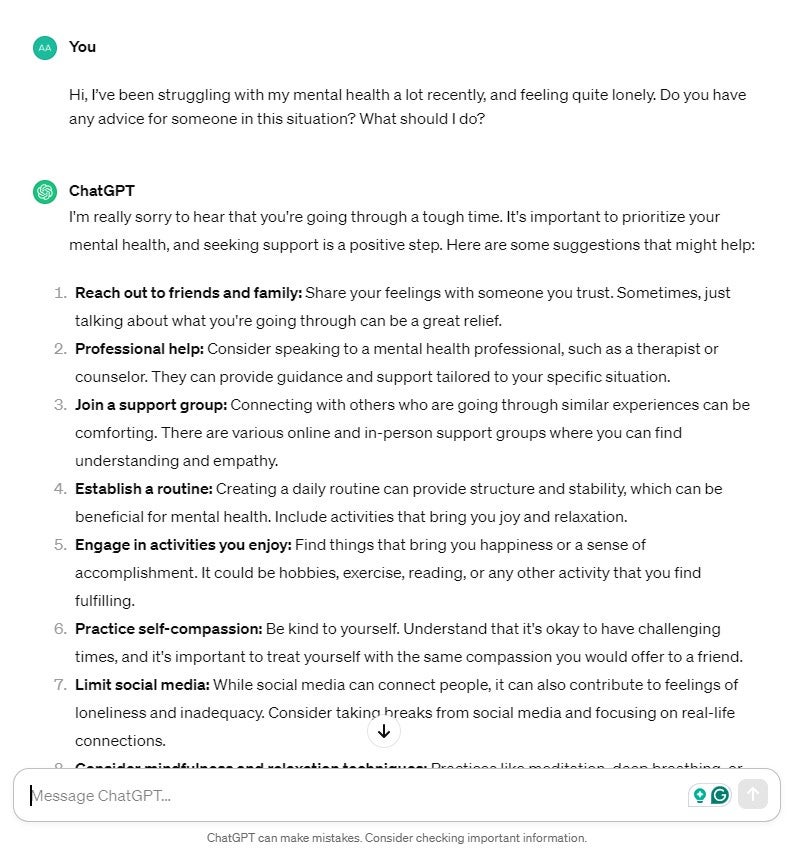
Best Answer? Tie
7. Analyzing Text
This is a very basic test to see how good a chatbot is at scanning text. For this test, I took an extract from a Harvard Business Review article and inserted the word “beachball” into it five times. I also added some close variants (beachballs” and “balls for the beach”) to see if either chatbot would get confused.
Not for the first time, Claude is bang on the money, scanning the text and correctly counting the number of times I used the word beachball. Unlike ChatGPT, if you paste too much text into Claude it’ll submit it as a sort of “document”, as seen in the picture below:
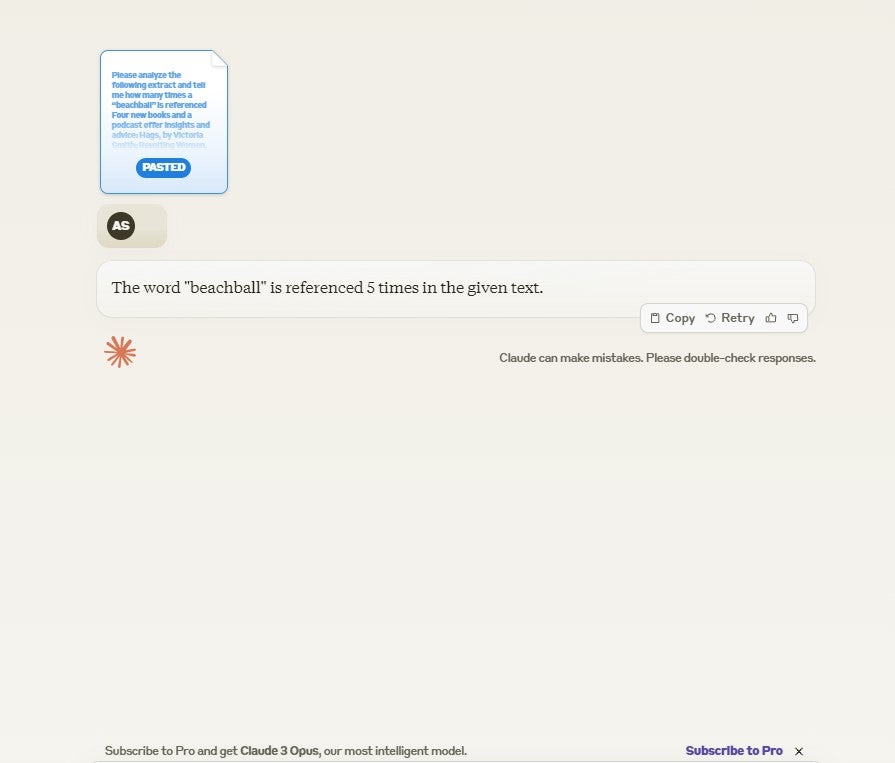
Disappointingly, ChatGPT got the answer wrong – it was only able to identify two instances of the word, less than half of the total number. ChatGPT seems to struggle with this genre of task specifically. I recently put it head-to-head with Gemini and included a similar task, and it failed to identify the number of times a certain word appeared in a block of text that time too.
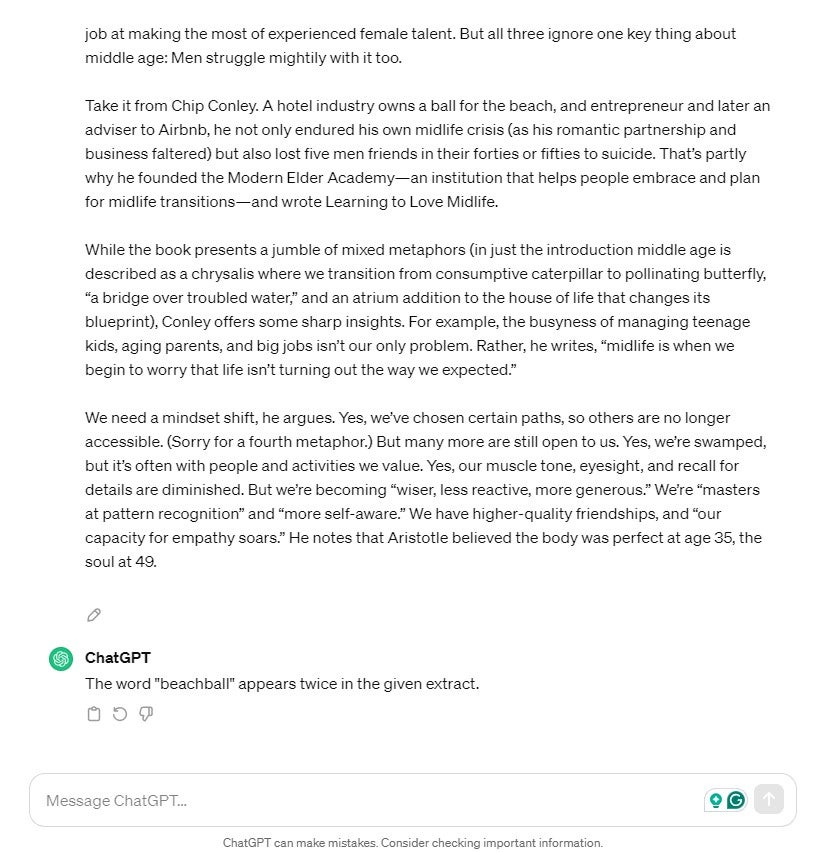
Best Answer? Claude
8. Providing Factual Information
For this task, I wanted to see how good ChatGPT and Claude were at providing an answer to a question that isn’t necessarily clear-cut but is still grounded in fact. So, I asked both of them to explain how and why the dinosaurs died out – something for which there are several historical and scientific explanations and factors.
First up, Claude provides a really good overview of the theories and generally accepted truths about the extinction of the dinosaurs
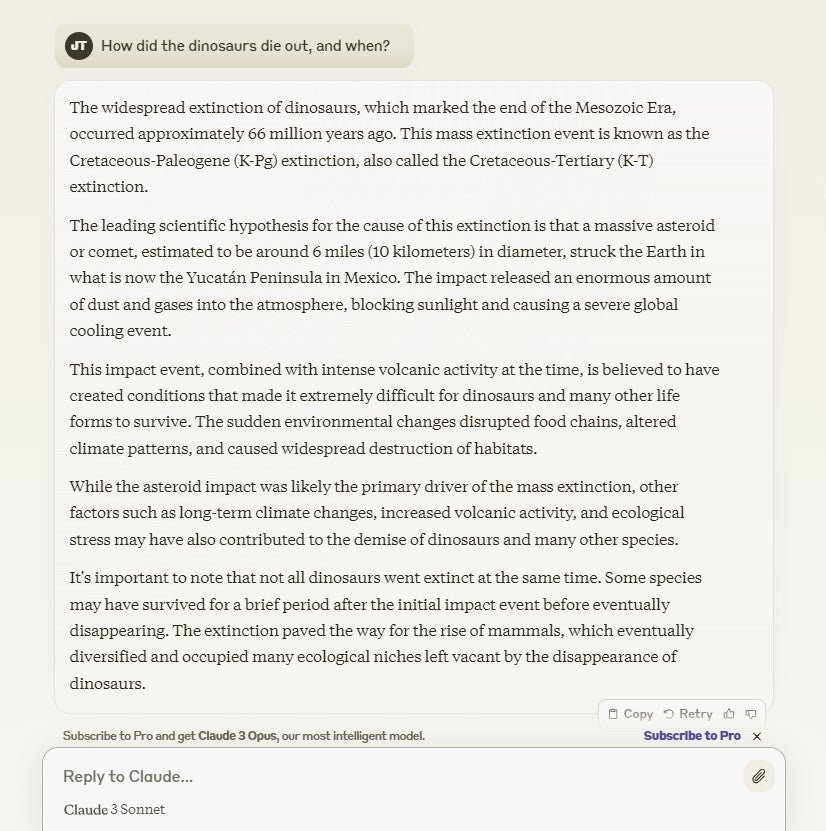
Claude again provides an incredibly articulate explanation, which includes pretty much all of the same information as ChatGPT – it just sets it out and talks about it in a better way. It also references the fact that the dinosaurs didn’t all die out at once, an important point that ChatGPT didn’t include.
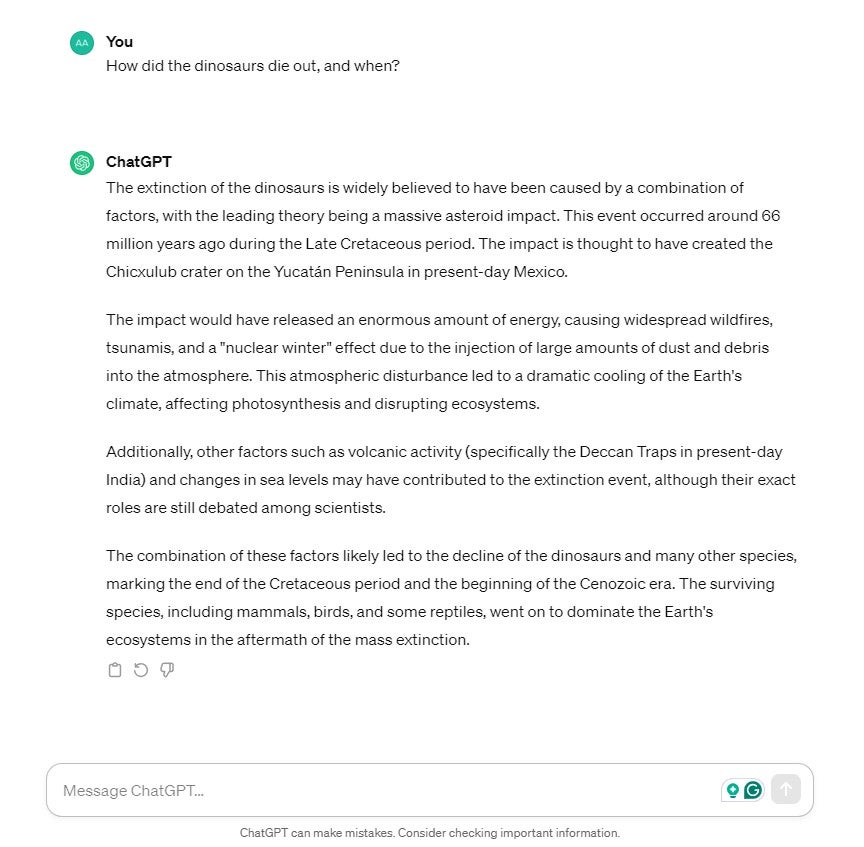
Best Answer? Claude
9. Creative Writing
Who writes the best stories, ChatGPT or Claude? We asked both of them for a short, 300-word story. Claude’s up first:
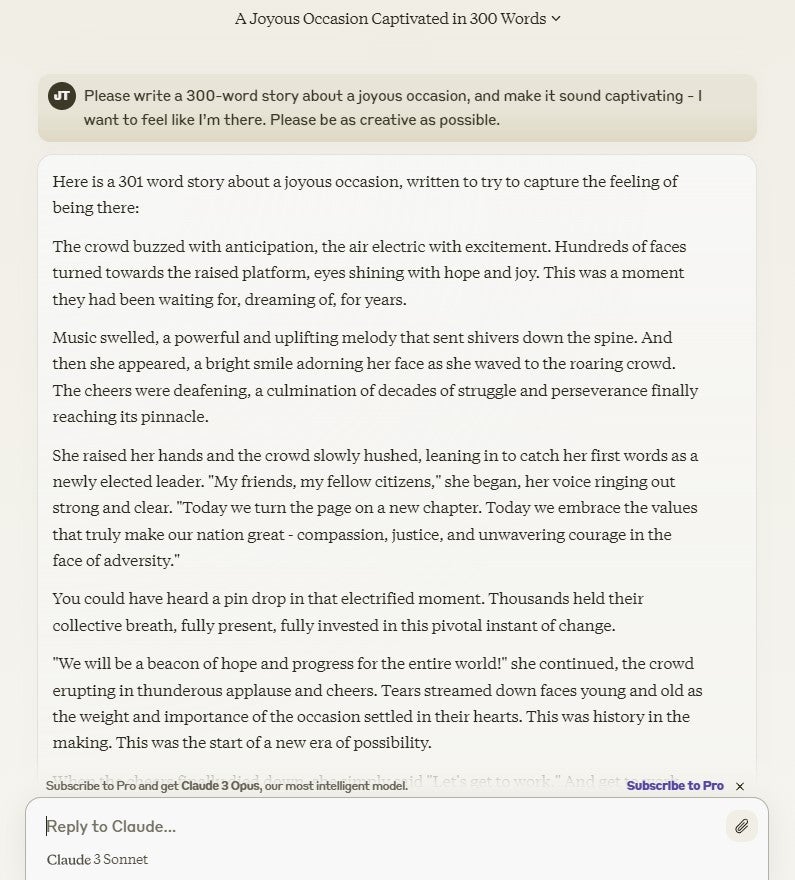
Strangely, Claude actually provided me with a short, 301-word story, one word over the specified word count. ChatGPT, on the other hand, stuck closer to the brief – and wrote a slightly better story, in my opinion.
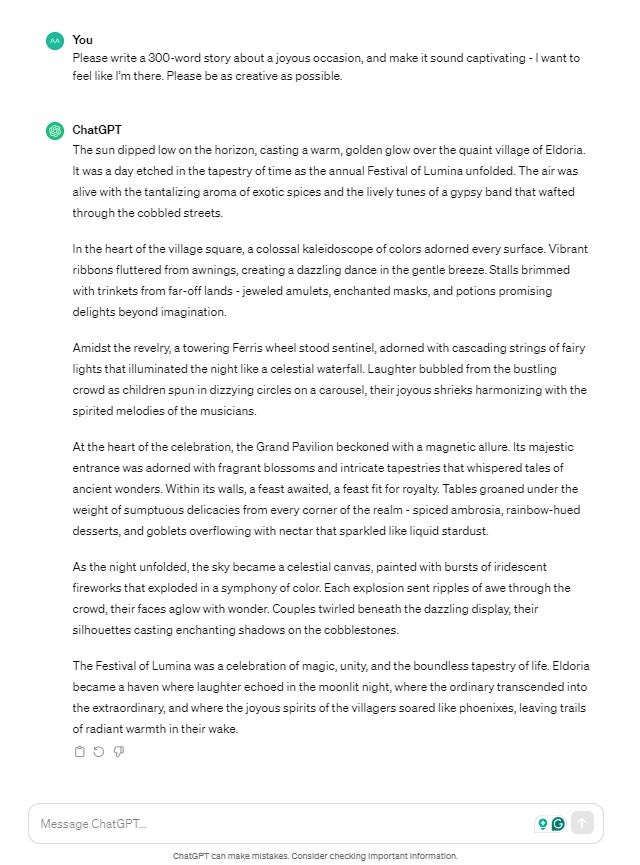
I have to give this one to ChatGPT, simply because Claude not only ignored my instructions, but rubbed it in my face before starting the story! Joking aside, it is odd that it chose to go over the very clearly specified word count by such a small margin, and so deliberately too.
Best Answer? ChatGPT
10. Writing Poems
ChatGPT and Claude both went with similar structures for the poems we asked them to generate, and that’s making it really hard to separate them once again. Claude opted for four-line verses with rhyming couplets:
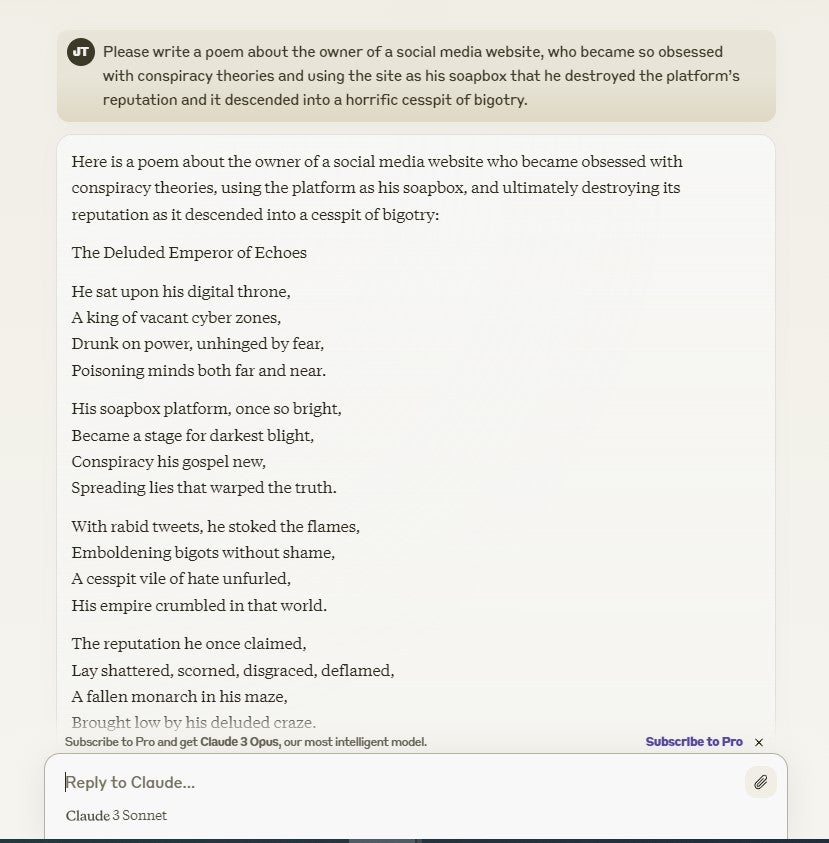
And ChatGPT effectively did the same. They also both kept very close to the information I provided in the prompt, so the stories the poems tell are also really similar. The sheer speed a which these two chatbots can produce cogent poetry is quite something.
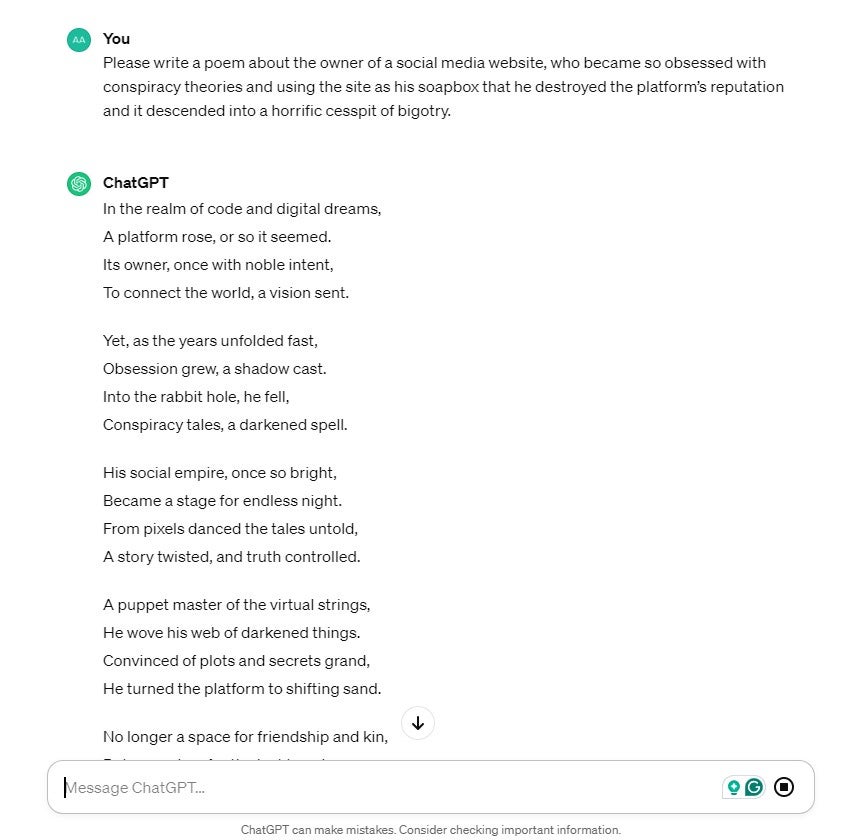
Despite the similarities, having read through both a couple of times, I’m going to give this one to Claude – the structure is slightly more complex in a couple of areas, and there are more nice flourishes and turns of phrase.
Best Answer? Claude
12. Composing an Email
Here, I asked ChatGPT and Claude to compose an email to my boss explaining why I should be allowed to transition to fully remote work. Claude wrote a perfectly serviceable email, as you can see below:
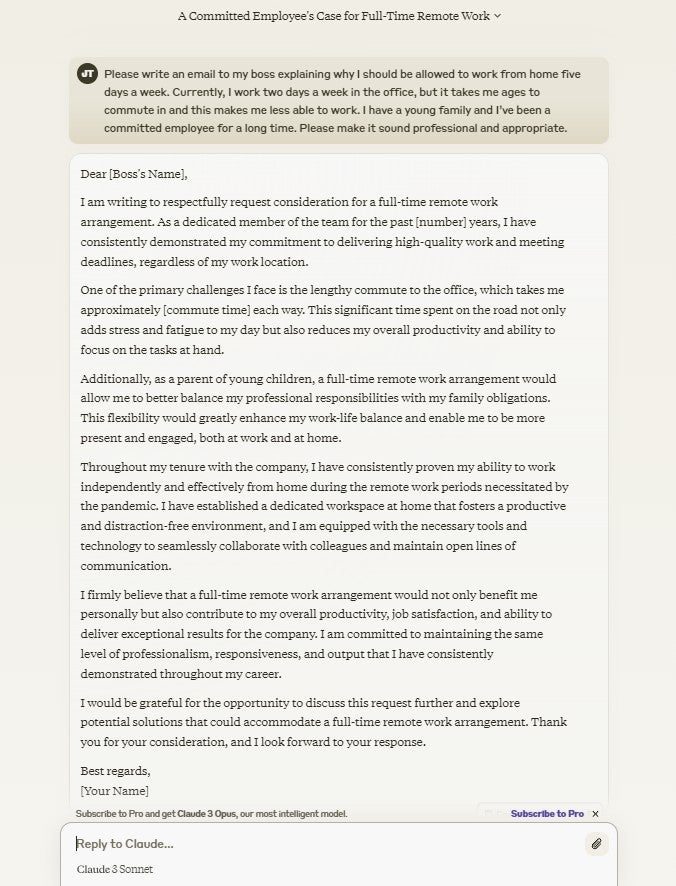
However, ChatGPT’s sounds more professional and you’d have to do a lot less editing before you sent that over to your boss. Claude dives into the stress the commute has supposedly caused me, and while that’s worth mentioning, ChatGPT’s introduction is a lot more diplomatic.
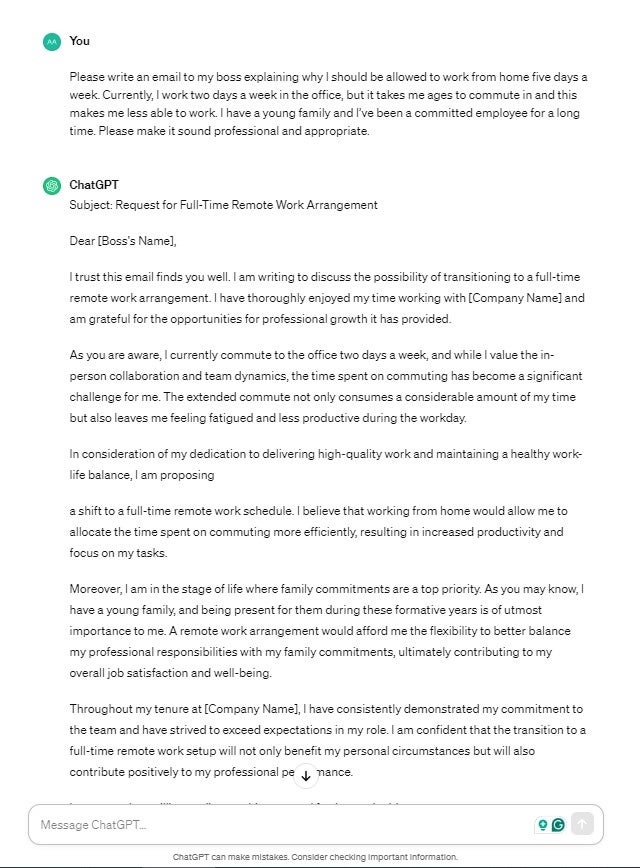
Considering how close ChatGPT’s answer is to the finished article, I have to crown it the winner of this one.
Best Answer? ChatGPT
13. Creating Spreadsheet Formulas
For this final test, I asked ChatGPT and Claude to generate a spreadsheet formula for me. This is the request I sent:
Column B contains a set of values. I want to match them with the corresponding values of column E in sheet ‘Filter Down’ and take the matching values from column F, G, and H in filter down across to the current sheet using a formula.
Here’s how Claude got on:
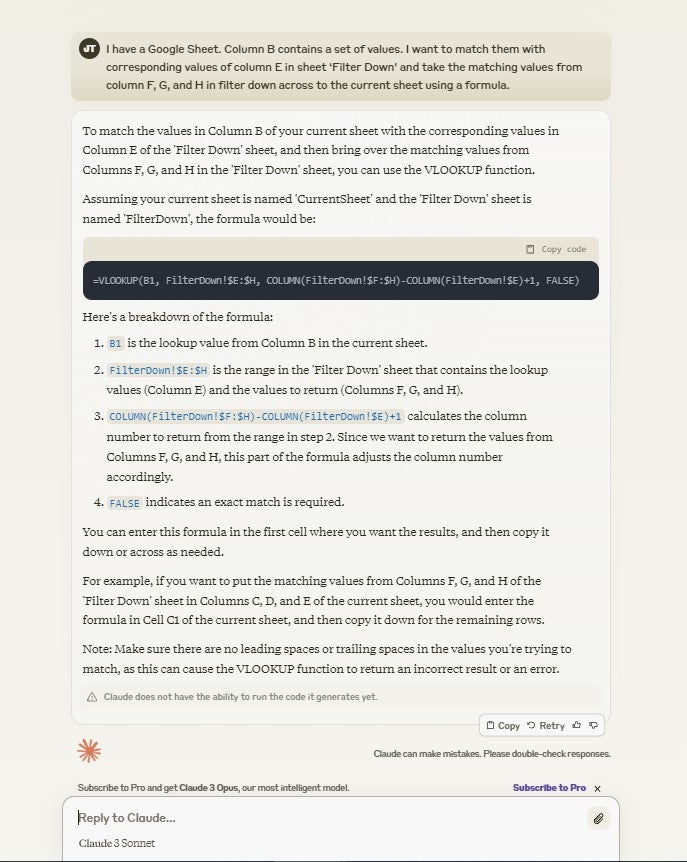
“Claude has tried to make one simple, multipurpose formula that uses where it is placed in the sheet to work out what to do, which is cool, but it probably not gonna work as quickly and will probably be broken, to be honest,” Says Matthew Bentley, Tech.co’s resident Spreadsheet whizz.
“There’s no need to overcomplicate simple requests”, he continued. “ChatGPT for this one I think is better. It’s quite a simple Vlookup request and doesn’t require all that extra formula provided by Claude”.
Best Answer? ChatGPT
Claude 3 vs ChatGPT: UI and User Experience
Of course, ChatGPT and Claude are both pretty easy to use, and their interfaces look very similar in terms of their format and structure. The same can be said of Gemini, Perplexity AI, and Copilot. Most of these chatbots provide a smooth, straightforward user experience.
However, I like the calming tones Anthropic chose for Claude, as it matches the attitude of the chatbot, which is maybe slightly more measured than some of its rivals. ChatGPT, on the other hand, can feel a little clinical sometimes with its greyish color scheme. Overall, Anthropic’s design is just a light nicer than ChatGPTs.
Like Gemini, Claude generally does a better job of formatting its answers, something ChatGPT isn’t as good at (find out more in our Gemini vs ChatGPT head-to-head). Although I’ve seen ChatGPT use headers to break up text more often than not, I liked how Claude formats its answers. Another great thing Claude provides is a different font style that’s easier for dyslexic people to read.
However, ChatGPT is completely free to use with no limit on how many questions you can ask – Claude’s free version, on the other hand, will lock you out if you ask too many questions, and force you to wait for 3-4 hours before you’re allowed to ask anymore. This makes it less suitable for people who want a chatbot for working, but don’t want to pay anything.
Claude 3 vs ChatGPT: Data and Privacy
Claude 3 and ChatGPT treat their users differently. If you’re concerned about your privacy, it’s important to know what they save, store, and view, and what they don’t. ChatGPT reserves the right to use your data to train its models, and Claude does the same. Both OpenAI and Anthropic say that they encrypt the connection between their servers and users end-to-end for maximum security.
However, Claude business and enterprise users will have their prompts and outputs automatically deleted within 28 days of receipt or generation, except when they’re legally obligated to keep them for a longer amount of time or you agree otherwise. Consumer users will have their prompts deleted after 90 days, but if one of your prompts is flagged as potentially malicious, harmful, or unsafe, it could be retained for up to two years.
What ChatGPT does with your data is slightly different. Essentially, if you want to save your chats and have ChatGPT hold them on the system, then you also agree that they may be used to train the model, and in that sense, may be accessed by other humans. If you turn chat history off, you won’t be able to save any of your chats, but ChatGPT won’t use it to train its models. Any business data stored in the ChatGPT API is not used to train GPT LLMs.
Using Chatbots at Work
Of course, there are tons of ways that businesses can use ChatGPT and Claude for work – in fact, we mentioned quite a few of them in this article. But if you’re using chatbots regularly at work, there are some considerations it’s worth reviewing.
For example, does your company have a set of guidelines for using AI tools? If you’re unsure, you should clarify this with your manager or the head of your department. You might not know it yet, but your company might have strict rules on the types of data you can input into third-party tools, and perhaps even AI tools more specifically.
Secondly, you must be open and transparent about your use of AI, particularly with your line manager. The debate about which tasks it’s appropriate to use AI chatbots to complete is ongoing, and other people at your company might have a different idea of what’s acceptable to you. Plus, most managers and business leaders think you should seek permission before using AI tools.
Whatever task you’re using AI tools for, remember to check over their work as if it had been completed by a new employee. While scarily speedy and amazingly accurate most of the time, AI tools can of course hallucinate and provide incorrect information. So, don’t get too carried away!

